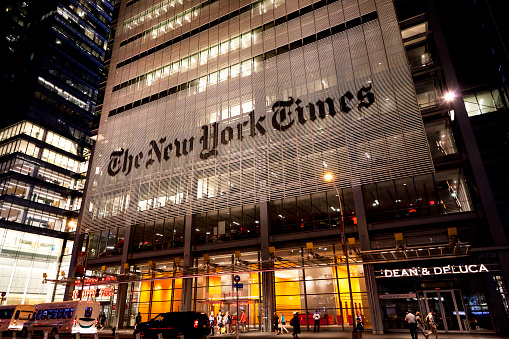The publisher of the New York Times took to his own op-ed page to explain and defend the complex and sometimes dangerous role that journalists play in the effort to “shine a light” on global and domestic conflicts, injustice and tyranny — and on his dim view of President Trump’s politically driven campaign to label anything smacking of criticism as “fake news.”
A.G. Sulzberger said this is “a perilous moment for journalism, for free expression and for an informed public.
Sulzberger illustrated his piece — drawn from a talk he gave at Brown University on Monday — with several examples, notably the previously unreported near-arrest of a veteran Times reporter by the Egyptian government in 2017.
“(L)et me tell you a story I’ve never shared publicly before,” Sulzberger wrote. “Two years ago, we got a call from [an unnamed] United States government official warning us of the imminent arrest of a New York Times reporter based in Egypt named Declan Walsh.”
Sulzberger said that while the news was “alarming,” it was also “fairly standard,” since the Times had received “countless such warnings” from various U.S. officials in the past.
“But this particular call took a surprising and distressing turn,” Sulzberger said.
“We learned the official was passing along this warning without the knowledge or permission of the Trump administration. Rather than trying to stop the Egyptian government or assist the reporter, the official believed, the Trump administration intended to sit on the information and let the arrest be carried out.”
In the past, Egypt had imprisoned many journalists, sometimes for years. The U.S.-based Committee to Protect Journalists (CPJ) calls the country “one of the world’s biggest prisons for journalists.”
So the Times turned to Walsh’s native country — Ireland — for help.
“Within an hour, Irish diplomats traveled to [Walsh’s] house and safely escorted him to the airport before Egyptian forces could detain him,” Sulzberger said, adding that another Times correspondent, David Kirkpatrick, was detained and deported by Egypt early this year.
And so back to Trump’s relentless campaign against journalism.
“Since assuming office, President Trump has tweeted about ‘fake news’ nearly 600 times,” Sulzberger said. “His most frequent targets are independent news organizations with a deep commitment to reporting fairly and accurately.
“But when the president decries ‘fake news,’ he’s not interested in actual mistakes. He’s trying to delegitimize real news, dismissing factual and fair reporting as politically motivated fabrications.”
In doing so, Sulzberger said, Trump has undermined Americans’ faith in “news organizations attempting to hold him accountable.
“He has effectively given foreign leaders permission to do the same with their countries’ journalists, and even given them the vocabulary with which to do it.”
Sulzberger said he has discussed his concerns directly with Trump, who “listened politely” but has “continued to escalate his anti-press rhetoric.”



